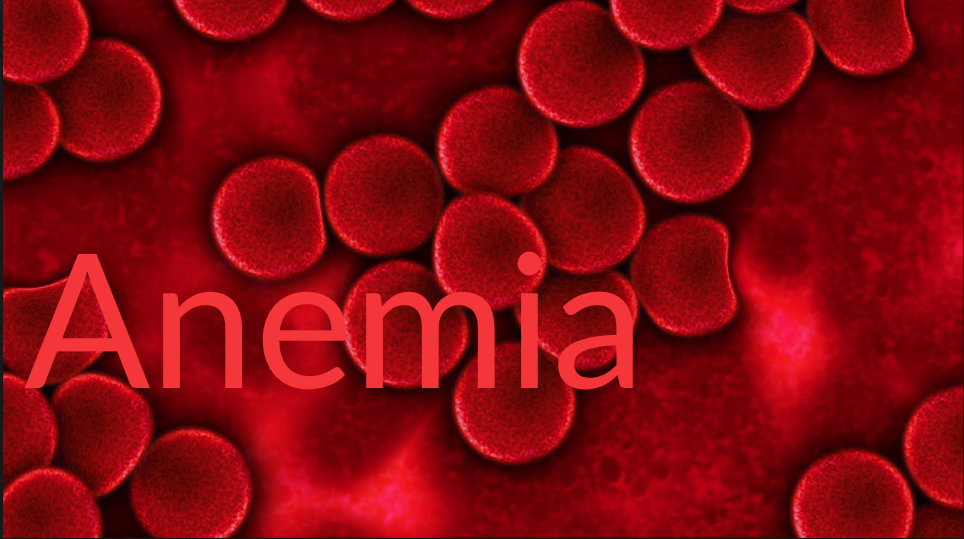Anemia is related to a problem with the hemoglobin cell that carries oxygen throughout the body. When the body is unable to get enough oxygen to the cells and tissues, the body feels weak and fatigued. Oxygen to the cells is needed to keep the brain, tissues and organs all working properly. Hemaglobin is produced with iron, and if a person is deficient in the mineral, either because of poor diet, blood loss, pregnancy or other cause, he or she is likely to feel sluggish and tired.
What are the Symptoms?
- Fatigue
- Weakness
- Lightheadedness
- Dizziness or fainting
- Cold extremities
- Pale skin, lips and nail beds
- Difficulty paying attention
What are the Causes?
- Insufficient Iron
- Insufficient Vitamin B12
- Insufficient Folate
- Elderly, or people with digestive orders, Crohn’s disease or ulcerative colitis are unable to absorb the nutrients from the food
- This leads to lack of vitamins and minerals
- Loss of Blood
- Always find the root cause and treat that not the symptom
What Should I Eat?
- Liver: Beef liver and chicken liver are very high in iron, B12 and a variety of other important nutrients.
- If unable to consume liver, make sure to include grass-fed, organic beef as an alternative.
- Blackstrap molasses: Take a spoonful daily, as it is very high in iron.
- Brewer’s yeast: High in folic acid, B12 and iron. Add to cereal, salad or juice.
- Foods high in vitamin C: Vitamin C helps with iron absorption. If you are eating a high-iron food (e.g. beef), try to include a source of vitamin C at that same meal, such as tomatoes, peppers or strawberries.
- Green leafy vegetables: These provide a significant amount of iron and folic acid.
- Other green leafy vegetables to include are steamed kale and broccoli.
- Probiotic-rich foods: Increase the absorption of iron and B-vitamins, so consuming 1-3 servings daily of kefir, yogurt and fermented vegetables is helpful.
What Should I Not Eat?
- Chocolate: Chocolate contains a substance that removes iron from your body, so it is best to avoid when you are trying to increase your iron levels.
- Bran: Bran is high in insoluble fiber, which traps and removes iron during digestion.
- Conventional dairy: Calcium binds with iron in foods and can lead to poor absorption.
- Soda: Soda blocks iron absorption, as well as is high in sugar and poor in nutrients.
- Coffee and black tea: Excessive coffee intake may block iron absorption, so reduce it to no more than one cup per day.
- Cold foods: Foods that are cold including ice water, ice cream and smoothies tax the spleen and can contribute to anemia.
What Should I Take?
- Iron (25 to 30 mg, daily) – Look for iron chelate that is generally well-absorbed. Take with a vitamin
C source and avoid calcium supplements. Iron supplements can cause constipation, therefore, it is important to confirm that anemia is being caused by iron deficiency. Ask your doctor for a blood test before boosting your iron intake. - Vitamin B12 (1,000 mcg daily) – A deficiency in this vitamin may cause anemia, but since B12 is water-soluble, it is generally not harmful for most people to take as a supplement. Your doctor may recommend higher levels of B12 if you are deficient.
- Folate (800 to 1200 mcg, daily) – Folate deficiency can also lead to anemia. Women of childbearing age who take birth control pills are especially prone to folate deficiency. Your doctor may recommend a higher level than what is listed here.
- Vitamin C (500 mg, daily) – Helps with absorption of iron.
- Green superfood powder (1 scoop, daily) – Choose one that contains spirulina, vitamin B12, dandelion and folic acid.
- Probiotics are essential for nutrient absorption. Consume 50-100 billion units of a quality probiotic supplement daily – you can get this from Kefir water and Kefir milk
If you have found this information useful or you have anything to add please leave your comment below.

